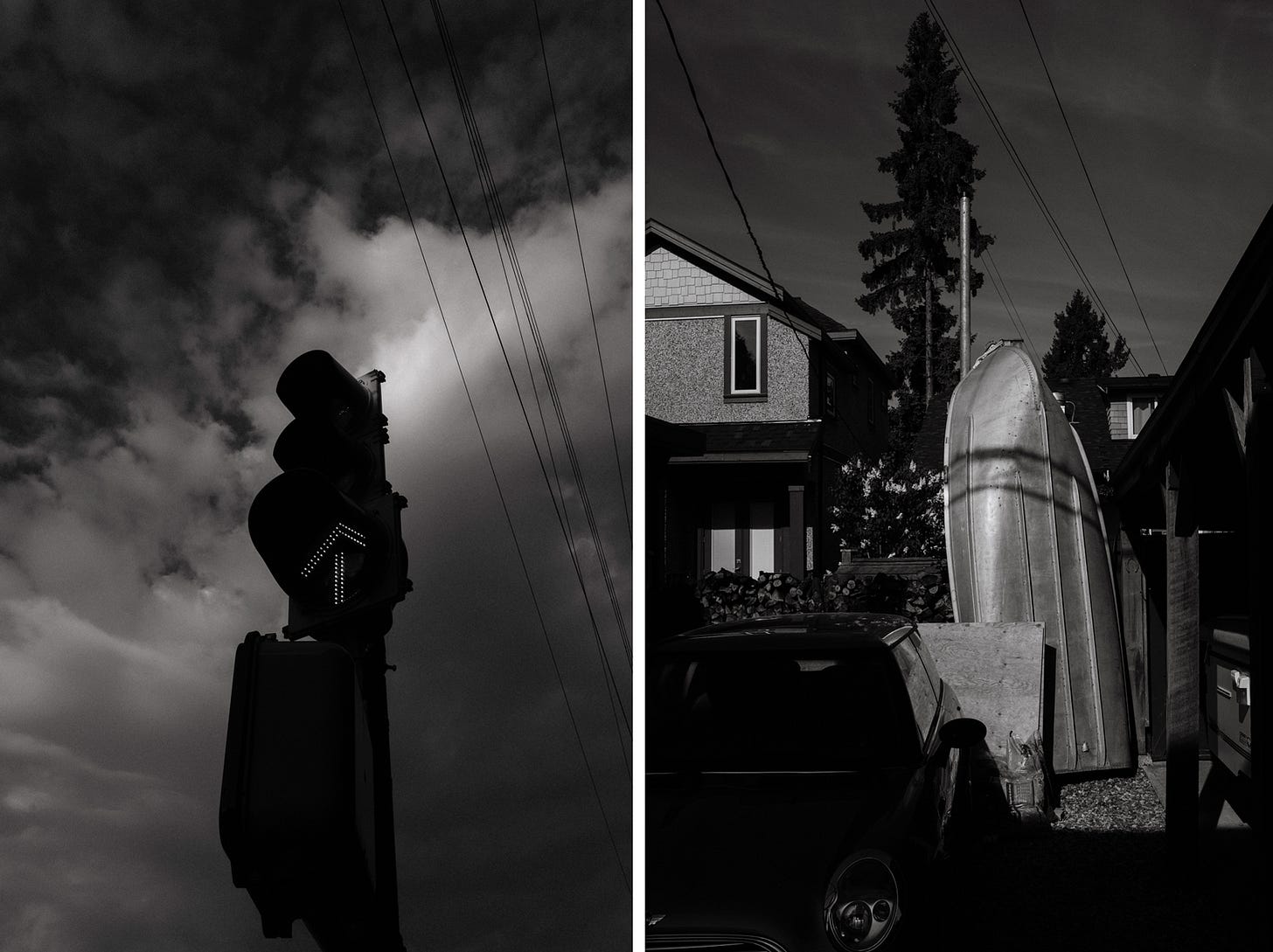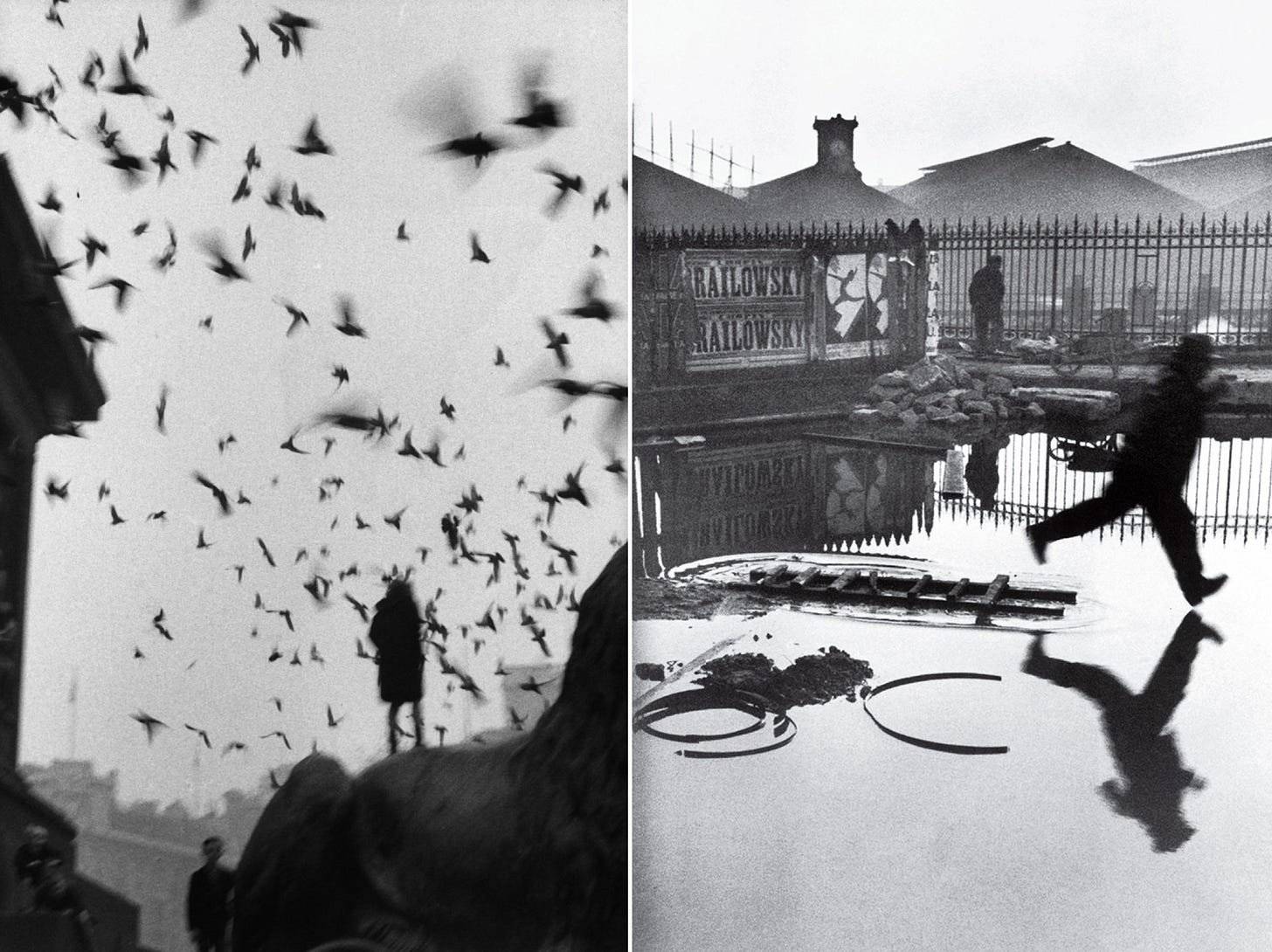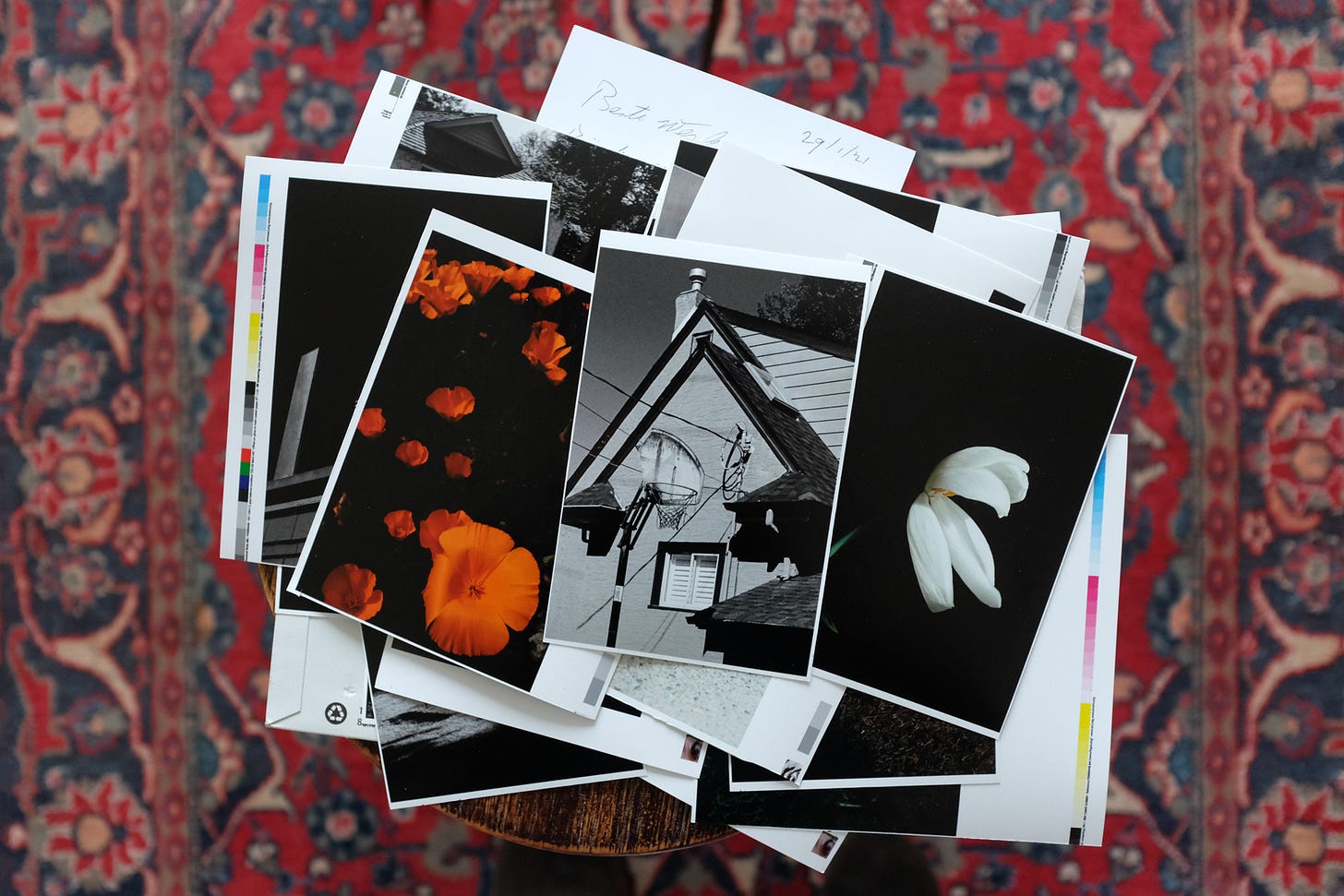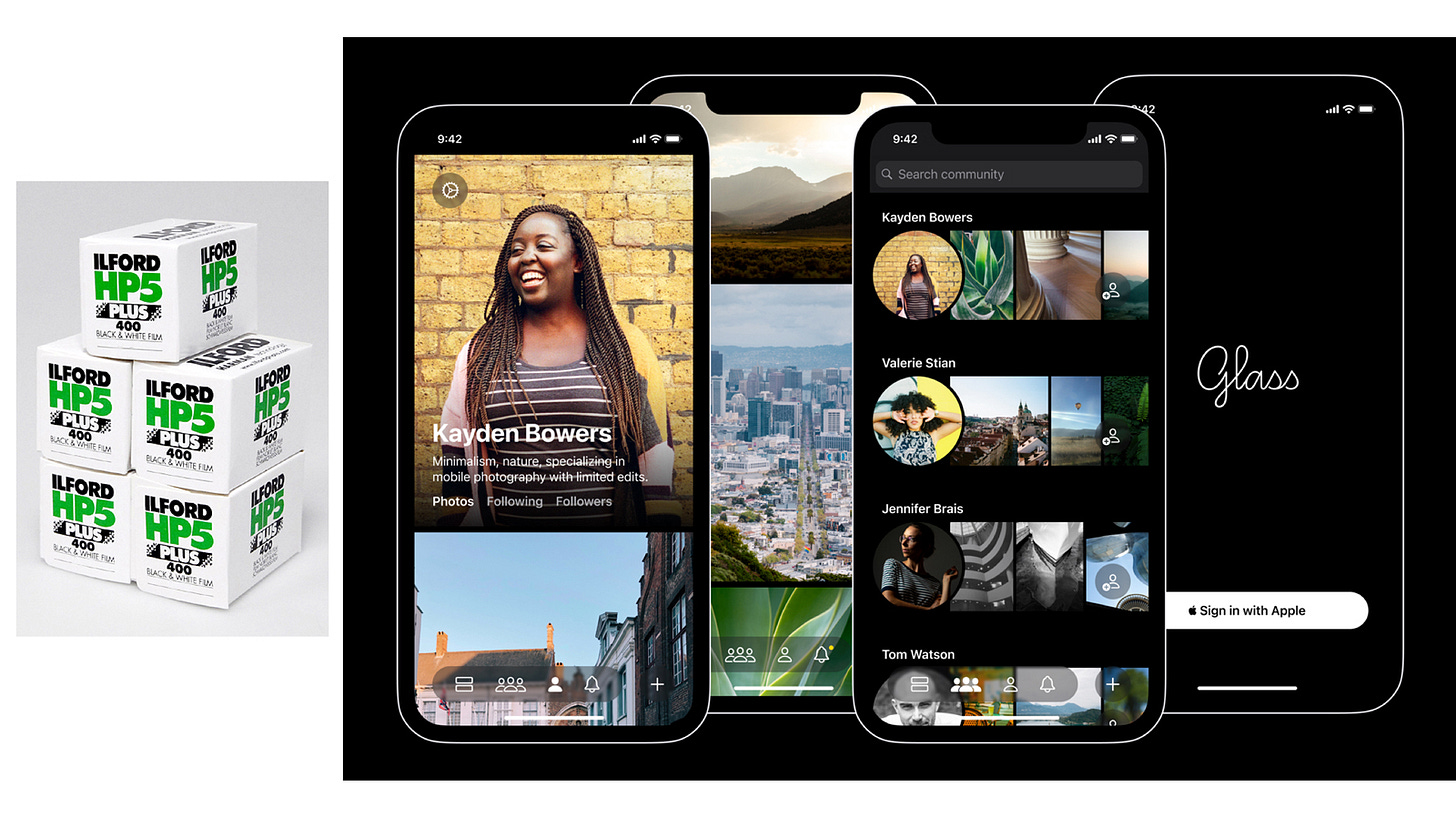Process 024 ☼ Five Beliefs That Hold Photographers Back
Giveaway: 5 pack of Ilford HP5 film courtesy of Glass
Dear friends,
In this letter we’ll go over some commonly held beliefs that can hold us back from becoming a better photographer.
For this week’s giveaway we have a 5-pack of Ilford HP5 film courtesy of the team at Glass, a new photo-sharing app.
We All Hold Self-Defeating Beliefs
Most humans have a tendency to form self-defeating narratives that prevent us from growing. This goes for photographers too. For example, I used to tell myself that I was a portrait photographer who was not very good at landscapes. This became a self-fulfilling prophecy until I broke up with that belief. I dedicated myself to studying and practicing landscapes until I was good enough to pick up clients in that field.
Below are five of the most commonly held self-defeating beliefs as shared by the Process community. Hearing about other people’s challenges can help us identify our own and recognizing is the first step towards change and growth.
1. My Surroundings Are Boring
Dominik Metzger shares:
The belief often holding me back is the thought that my neighbourhood and my city is boring and not worth shooting. That I have to go to the US, or Tokyo. Even though I know that many photographers I admire actually did document their city and surroundings.
Most of us can relate to this, even those of us who live in exceptionally exciting places can trick ourselves into thinking that the familiar is boring. For example, for the first 15 years of living in New York City I rarely documented the city. I’d shoot roll after roll while traveling and then come home and barely shoot. It’s baffling in hindsight!
In 2020 I could have easily fallen victim to this mentality again. When the pandemic hit and left me stranded in a quiet suburban area of Vancouver I could no longer run around the city to photograph strangers. Thankfully I had learned this lesson before.
Instead of giving in to the belief that nothing interesting could be photographed in this quiet neighborhood, I committed to going on a photo walk every day. I looked closely and found a universe of beauty right in front of me. Regular Process readers know that the body of work that I shot during this 123 day period is soon to be “Notice”, my first official photo book. More on that later. Some b-sides:
Takeaway: Don’t overthink, start shooting. Pay attention, get close, focus on noticing things you might usually rush by. Every town is an infinite collection of stories.
2. Everything I Shoot Must Fit A Grand Vision
Ryan Belk shares:
I’m often held back by trying to figure out what to shoot instead of just going out and shooting. I get so hung up on the greater vision of a potential project that I get stuck and end up not doing anything. I’ll think I need to orchestrate this big shoot or long term project to make great work but in reality I need to shoot in my city, my people closest to me, etc.
It’s easy to overwhelm ourselves into creative paralysis, but not every photo needs to fit a into a pre-conceived project, and not every project has to be planned out.
Takeaway: Don’t overthink, start shooting, and let projects emerge on their own time. Some photos turn into projects many years after being taken. Be patient with yourself.
3. A Great Photo Must Be Technically Perfect
Jaap Eijsker shares:
Something that limits me as a photographer is my subconscious conviction that all photos should be technically perfect. Sharp, no imperfections, noise-free, etc. Even though some of my favorite photos by other photographers could have been taken by a potato with a sensor but focus on atmosphere, feeling or story.
Jaap already talked his way through his dilemma by the end. Technical perfection does not make a photo great, not do imperfections mean that a photo can’t be great.
Below are two of my favorite images of all time. On the left we have a photo by Sergio Larrain and on the right one of Henri Cartier-Bresson’s most famous shots. Neither are in focus, nor sharp, nor noise free, but they make me FEEL! That’s what counts.
Takeaway: Stop thinking, start shooting. Focus on telling a story and evoking emotion and don’t discount photos based only on technical imperfections.
4. I’m Not Good Enough or Popular Enough
Zach Liebenson shares:
Something that I feel has limited my growth as a visual storyteller is constantly comparing my work to that of other photographers. Seeing all the amazing film photographers in the community has discouraged me from putting a lot of my work out there, because I just don't feel it's good enough.
Social media has made it easier to find like-minded artists, but it has also burdened us with the false belief that we must always be creating and sharing amazing work, without any periods of rest or reflection. That’s not reasonable or healthy. And neither is comparing other people’s highlight reels to our own messy work-in-progress.
Ben W. Fey, who recently released a new zine, shares a related belief:
Something that holds me back is the “need" to gain social media followers and get more "likes" to make my art have value. I struggle with the idea of not sharing on social media because I don't know how else to reach others outside of close friends and family members. I wonder if I need to keep some of my art to myself for longer before sharing.
Most of us have been part of helping social media companies create an environment that turns visual art into a commodity where popularity equals quality. The more likes, the better the photo? Not true, but it’s so easy to get caught up in that line of thinking.
When we de-prioritize social media we save time that can be spent on shooting more, reading photo books, and cultivating genuine community in a slower and more meaningful way. I started Process in part out of a desire to create a calmer and more personal environment where I can share work. The same goes for my book. Taking my time to put together a larger project has been so much nicer than daily posts.
Takeaway: Take breaks from creating and sharing work, build a supportive community away from social media (on and offline). Create a project with a physical component, whether it’s a zine or a print, and get feedback from people in person.
5. I Must Appeal To Everyone
Sinjin shared:
A belief that is reinforced in the art school setting that I am currently in is that personal narrative isn't something that a general audience can relate too and therefor isn't worth pursuing.
Allow me to bring in my favorite movie director of all time, Martin Scorsese, and his words of wisdom that were shared most recently during Bong Joon-ho’s Oscar acceptance speech: “The most personal is the most creative.”
Let me add to this a complimentary quote by preeminent psychotherapist Carl R. Rogers who said: “What is most personal is most universal.”
If Scorsese and Rogers put it that way, who are we to argue?
Takeaway: Make your work as personal as you feel like. At the same time, not all work has to be personal. You set your own boundaries.
Alright there we go. Thank you to everyone that sent in their self-defeating beliefs. I hope this will motivate you all to think through your own and liberate yourself.
Notice Book Update
Today I received the first set of test prints from lithographer Sebastiaan. These are printed on generic paper and are the first step in determining how the colors and levels need to adjusted so the book comes out exactly how it should.
Next we tweak and move to print on the actual type of paper the book will be printed on. The book will be a cloth-bound hardcover and this week we should receive some initial cloth samples to see which feels the best and has the most accurate color.
I’m making a lot of progress on building the pre-order shop, we’re just weeks away!
That’s it for this week. Can you believe that next issue will be Process 025? Expect a very cool celebratory giveaway courtesy of my friends at Brooklyn Film Camera.
Keep shooting and take good care of yourselves and others.
Wesley
Process Giveaway!
A mutual friend recently introduced me to Tom Watson who co-founded a new private photo-sharing app called Glass. Tom invited me to be a beta-tester.
I like the philosophical underpinnings of Glass, with its chronological feed, no public like counts, EXIF data for each image, no tracking or data selling, and anti-harassment measures. It feels like it’s made for photographers, not influencers. Refreshing!
Since I enjoyed the app I asked if we could invite some Process readers to join as beta testers too and give away some film while we’re at it. So here we are!
To enter email me at hello@wesley.co (please don’t reply to this note but send a separate email) before 11pm EST on February 4th and answer the following question:
Imagine a photo project that you send to an audience of one: yourself in 20 years. What do you make? (Describe it in one short paragraph, say 3-4 sentences.)
One winner will be randomly drawn and receive a five pack of Ilford HP5 film and an invite to the Glass app as a beta-tester. Two additional people will also get an invite.
This giveaway is for Process subscribers only. Subscribe by clicking the button below:
Make sure to show Glass some love on Twitter and check out their website.
Would you like to support Process? Great! Tell your friends about it. Just click below:
If you’re a new reader, browse the Process archives here.
Process is a weekly letter from Wesley Verhoeve.
Follow along at @wesley.




